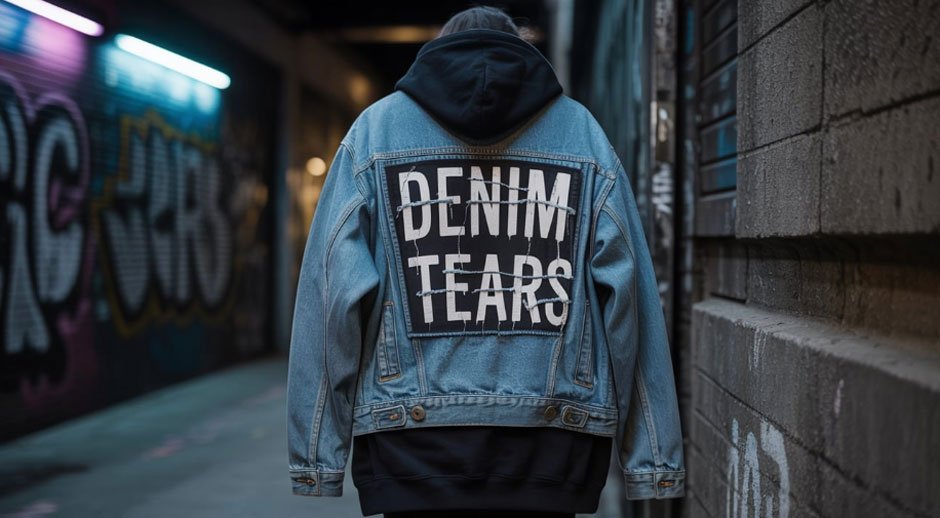In a cramped fashion landscape, place trends come and go, Denim Tears has gotten a distinct room not just for allure aesthetics, except for its unapologetic made-up story. Launched by designer and cultural commentator Tremaine Emory, Denim Tears is also a brand—it’s a movement that fuses streetwear fashion trends with deep cultural stories, primarily centered around the African American experience. As one of ultimate recognized Black-owned fashion brands, Denim Tears has risen to distinction with alluring, powerful designs and evocative collaborations.
The Origins of Denim Tears: Fashion as Resistance
Denim Tears was founded in 2019 by Tremaine Emory, an artistic polymath the one has worked with brands like Stüssy, Yeezy, and Supreme. But with Denim Tears, Emory had a different mission—an individual rooted in biography, ancestral trauma, and the reclaiming of similarity. The brand’s first drop, famously erected around Levi’s denim and trimmed with understated wreath motifs, serves as a visual analysis of slavery, labor, and American capitalism.
The Denim Tears brand doesn’t just sell clothing—it sells a message. Emory has expressed the brand as a way of investigating what it means to be Black in America, using fashion as an instrument to both educate and inflame.
Design Philosophy: Storytelling Through Fabric
Unlike many streetwear labels that prioritize advertising, Denim Tears designs are deliberate and thought-provoking. Emory frequently draws from historical references and Black educational milestones to instruct each piece. The cotton garland, which has become equivalent to the brand, is not just a beautiful choice—it’s a political statement. It calls attention to the inheritance of slavery in the American South and the forced labor behind the understand industry.
Many pieces from Denim Tears collections feature printed themes, archival images, and characters that challenge conventional fashion averages. Whether it’s a t-shirt adorned with Pan-African metaphors or a denim jacket narrating a slice of forgotten history, each article is a statement.
Collaborations that Resonate
Part of Denim Tears’ cultural footprint can be attributed to its powerful collaborations. The brand’s partnership accompanying Levi’s, for example, allowed Emory to call and reimagine American staples through a Black archival lens. These collections were not only precariously acclaimed but also sparked conversations stylish and beyond.
Denim Tears has still colluded with Converse, bearing sneakers that consume street style with Afrocentric design, and accompanying Champion on capsule collections that blend collegiate aesthetics accompanying radical Black iconography. These alliances have assisted in introducing the Denim Tears attire line to a more extensive audience while staying true to Allure’s core values.
The Cultural and Social Impact of Denim Tears
Denim Tears has enhanced a touchstone in up-to-date fashion for how it handles cultural reading and social knowledge. The brand isn’t afraid to tackle tough themes—racism, exploitation, correspondence, and resistance are spun into its fabric, exactly and metaphorically.
By achieving so, Denim Tears challenges the fashion industry to move further surface-level diversity and undertake meaningful representation. It’s unspecified a broader wave of Black-owned fashion brands redefining what luxury and streetwear can appear, proving that enlightening commentary can coexist with commercial advance.
Moreover, Tremaine Emory’s appointment as Creative Director of Supreme in 2022 (a position he held briefly but considerably) further spotlighted his influence in the all-encompassing streetwear scene. His philosophy at Denim Tears persists to inspire emerging designers to create with accompanying designs.
Sustainability and Ethical Production
While Denim Tears has not positioned itself heavily on sustainability, its importance on description and deliberate result inherently aligns with more moderate, more contemplative fashion practices. By focusing on restricted-release drops and preventing economic decline, the brand provides a more sustainable model despite everything that fast-fashion giants. Additionally, the brand’s distinction on ethical narratives about labor and ancient biases encourages consumers to think more critically about place and how their clothing is made.
Denim Tears and Streetwear Fashion Trends
The rise of Denim Tears coincides with a broader shift in streetwear fashion flows. Where once the setting was dominated by drawings and logos with little framework, today’s consumers demand domestic their brands ‘ authenticity, transparent, and insightful. Denim Tears answers that call by offering accumulations that are as intellectually rich as they are stylish.
This devotion to something depth is what makes Denim Tears attire a favorite with stars, artisans, and fashion insiders. From Frank Ocean to Virgil Abloh, the brand’s pieces have erect their way into the wardrobes of some of the last culturally powerful figures.
Where to Buy Denim Tears
Because of limited result runs and high demand, Denim Tears pieces frequently sell out fast. The brand’s official site (denimtears.com) is the basic sales center, but select items can further take place through stockists like Dover Street Market, SSENSE, and resale platforms, to a degree, Grailed or StockX. For fans and connoisseurs, staying updated on upcoming Denim Tears collections by way of Instagram and posting lists is essential, as drops are sparse but highly lusted after.
Conclusion
In a world of transient fashion moments, Denim Tears is conspicuous as a brand with purpose, honor, and vision. Tremaine Emory has favorably used attire as a medium to confront classical injustices, honor enlightening legacies, and shape the future of fashion. Whether you’re interested in streetwear fashion, seeking to support Black-owned fashion brands, or simply expect garments that are important, Denim Tears delivers on every level. It’s not almost what you wear—it’s about why you wear it.
